August 2014
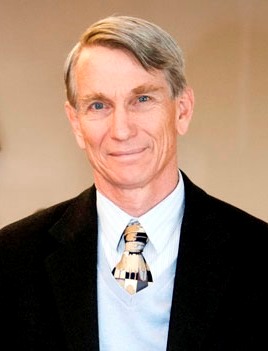 NOTES FROM THE ACADEMIC SENATE CHAIR
NOTES FROM THE ACADEMIC SENATE CHAIR
WILLIAM JACOB
Dear Colleagues,
As the 2013-14 academic year concludes, I want to offer some thoughts about what the Senate has accomplished, and also discuss some of my lingering concerns about the future.
The Senate’s work touches every aspect of the UC mission, but the Senate was particularly engaged in six areas this year, and our work is testimony to the importance of shared governance.
Equity and Fairness: At the beginning of the year, the Senate acted quickly and effectively to collaborate with the Provost in a response to the Moreno Report. I am proud of the critical role Academic Council members played in this effort to ensure the thoroughness and credibility of the final report and recommendations that I believe are substantive, not just symbolic, and will create stronger protections for faculty and a more inclusive social and academic climate. In addition, Council recently sent the president a letter urging more local Senate involvement in the development of campus-based studies of salary equity on the basis of gender and ethnicity and remediation plans to address problems. The University needs the Senate’s ongoing involvement to ensure that meaningful progress occurs.
Undergraduate Education: The Senate worked closely with Provost Dorr throughout the year to implement the Innovative Learning Technology Initiative (ILTI), which is currently funding 39 systemwide online courses available for cross-campus enrollment by UC students. This Senate-Administrative collaboration demonstrated that the Senate can take on the challenge of creating quality online education courses that enrich UC students’ educational experience without getting caught up in the hype that accompanied the MOOC hysteria of last year.
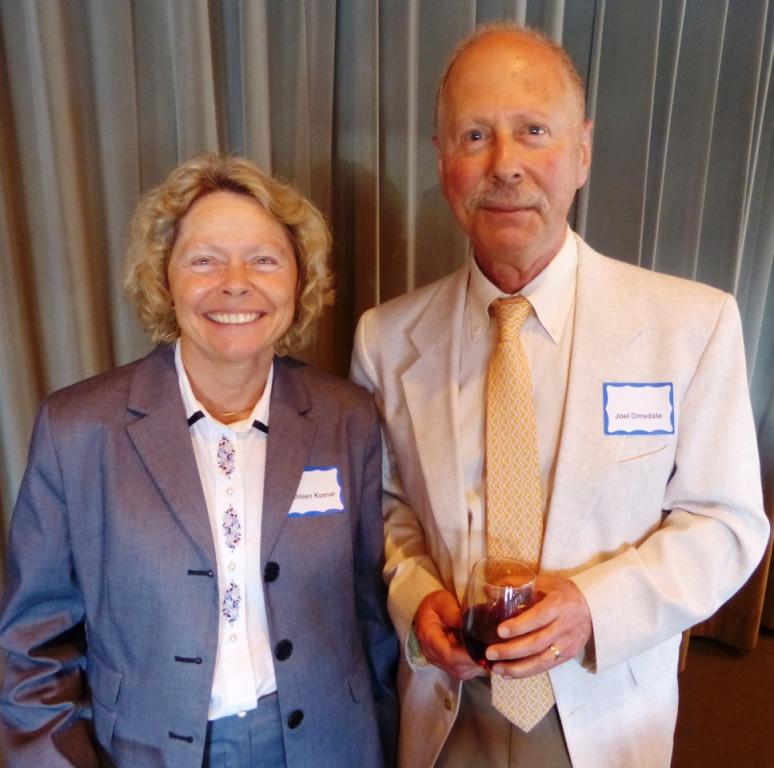 |
Oliver Johnson Award winners Kathleen Komar and Joel Dimsdale at the July 23, 2014 Academic Council dinner. |
Employee Welfare: The Senate, through UCFW and its Health Care and Investment and Retirement Task Forces, worked hard to address glitches in the implementation of UC Care, promoted the financial stability of UCRP, and ensured the completion of an updated study of total faculty remuneration. And thanks to a Senate-Administration collaboration facilitated by President Napolitano, we helped UC find its way through the morass of Composite Benefit Rates to arrive at a compromise agreement that is more equitable in its treatment of faculty and more flexible for campuses than the plan originally proposed. I have the fullest confidence that UCFW will remain on top of these issues in the years ahead.
Graduate Education: The Senate pressed for enhancements to graduate education in multiple forums. In November, Provost Dorr and I made a presentation to the Regents about the need to improve financial support for academic doctoral students. In April, Vice Chair Gilly and Provost Dorr co-chaired a systemwide Doctoral Student Support Conference at UC Irvine that built a solid consensus for actionable proposals to increase the competitiveness of UC’s financial offers to doctoral graduate students. Provost Dorr and Vice Chair Gilly will present these recommendations to the Regents next year.
Research: Council engaged the Administration on several critical aspects of the UC research mission, including a set of recommendations for enhancing central support for systemwide research, where a proper framework to restore balance is sorely needed. I have consistently raised the essential role of research in UC’s mission at every possible forum, including Regents meetings, reminding everyone that UC researchers direct five billion dollars in projects across the ten campuses, while the state’s total contribution to UC has fallen to less than three billion dollars annually.
Access and Outreach: The Senate was a major participant in the work of the Transfer Action Team (TAT), a joint group charged by the President with recommending ways to streamline and strengthen the transfer path from California Community Colleges to UC. BOARS chair George Johnson co-chaired the TAT with Vice President for Student Affairs Judy Sakaki. UCEP Chair Tim Labor and UCOPE Chair Ross Frank represented their committees. Chair Johnson and Vice President Sakaki presented the final report of the TAT to the Regents in May. We expect serious and ongoing work over the next year to implement the TAT’s recommendations.
I am proud of these Senate accomplishments, but I cannot leave this position without pointing to several concerns about the direction of the University and external pressures that threaten our mission.
The Master Plan’s designation of UC as the state’s research university helps ensure the physical and financial health of California by providing Californians with undergraduate, graduate and professional education rooted in scholarly research and inquiry. The knowledge created by faculty through their scholarship in the arts, humanities, social sciences, and STEM disciplines fuels the economy while also launching a continuous procession of highly educated and skilled citizens and workers to become the next generation of California leaders. This integration of scholarship and teaching sustains UC as the best public university in the world and helps build a better future for all of California.
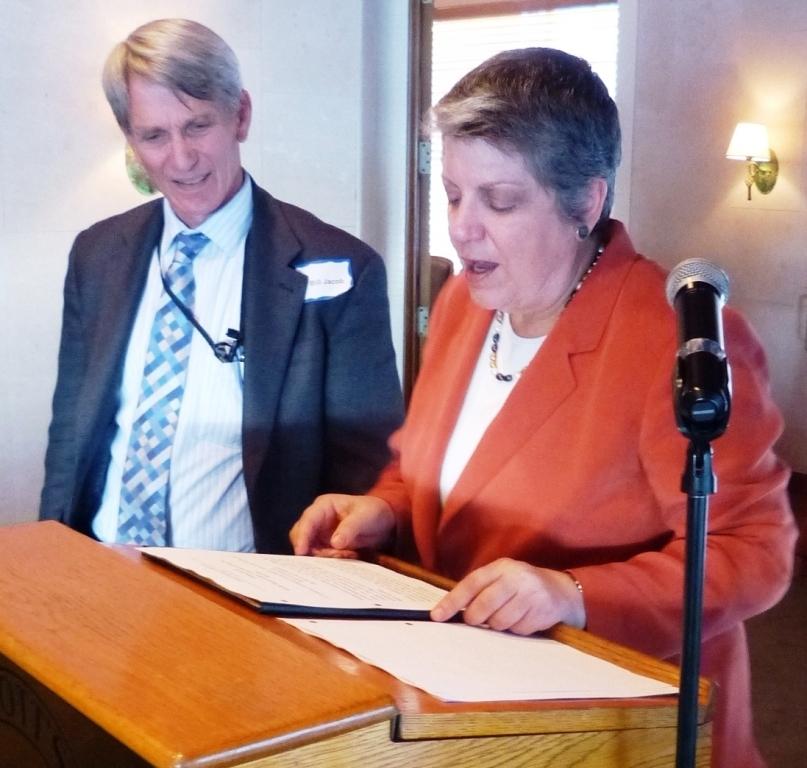 |
President Napolitano recognizes Chair Jacob at the July 23, 2014 Academic Council dinner |
Yet much of the recent external discourse about higher education and financial frameworks for the academy is based on a superficial understanding of how the university functions and the faculty’s research role. Budgetary pressures have led some policymakers to question the value of scholarship and to view faculty research and undergraduate education as requiring either/or choices. Others view research only through the lens of near-term technology transfer and commercialization. There is a national trend to examine public universities using a limited set of accountability measures focused on student throughput rather than the aggregate multidisciplinary scholarship that makes the academy vibrant.
This problem has now hit home. Although the state did halt the steep budget cuts of recent years, we have not made the progress we needed and expected after the passage of Proposition 30 last year. The Academic Senate fought hard for Proposition 30, as did educators across California, and we hoped it would bring a renewed commitment of state resources to higher education. Instead, the state has given us minimal increases that fall far short of restoring what was lost and is necessary to maintain UC quality. Moreover, the increases are tied to reporting and accountability measures rooted in ignorance of how UC operates and of its role in the state economy. Most recently, in spite of unanimous support from the state legislature, the Governor blocked a general obligation bond that if passed by the voters would have allowed public K-14 schools and universities to address critical infrastructure needs.
The Senate must help refocus the conversation and inform the public about the scope of the university, the role of the faculty in achieving our mission, the impact of university research, and the importance of supporting scholarship that embraces UC’s full teaching, research, and service missions in the arts, humanities, social sciences and STEM fields. We must be absolutely firm that the recent revision of regulations to monetize UC innovation using UC and external venture capital must not compromise academic freedom or our responsibilities to our graduate and postdoctoral students. Our internal discourse must focus on protecting the academic mission rather than echoing the latest business slogans involving efficiency and the free market.
UC leaders regularly present reinvestment in quality needs to the Regents and to policymakers in Sacramento, but they are routinely drawn off task by those who prioritize efficiencies, frozen budgets, and online education, who speculate about innovations that will improve “throughput,” and who propose metrics that attempt to determine faculty quality by a mechanically calculated “return on investment.” These reductionist notions distract us from the critical need to reduce class size, promote human-to-human interaction, and renew the infrastructure required to support the world’s finest public residential university.
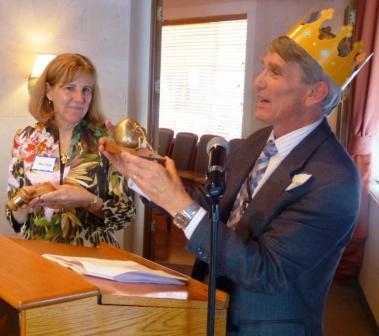 |
Chair Jacob passes the ceremonial Sisyphus sculpture to Vice Chair Gilly at the July 23, 2014 Council dinner |
Scholarship is far more than answers on a multiple choice test, and we must be clear that the cost of an education cannot be reduced to dollars per hour of “seat time.” We must also be clear that the free market cannot solve higher education’s problems. Let us not forget that the greatest breakthrough advances in the arts, humanities, medicine and technology come from academic researchers who set aside thoughts of being the next Rockefeller or Gates in order to devote their days to the library or laboratory.
We must reaffirm that UC’s mission is rooted in the scholarly enterprise, which requires shared governance, academic freedom, and a commitment to high quality teaching and research.
In the face of all this angst, UC has sustained access to an undergraduate education for a growing population; this year, more than thirteen percent of California public high school graduates received an offer to attend a UC campus to which they applied. As a former BOARS chair, I am proud of this. But we now need to bring other priorities into focus. UC is failing to meet growth goals for graduate doctoral enrollment essential to a world-class research university. We must ensure that conversations about the future of higher education do not deemphasize or degrade graduate and professional education, but instead preserve its critical place at the core of UC’s mission and message.
Finally, as I leave office, I want to issue a call to faculty on all campuses for close attention to new policies and initiatives that are developed and announced without full Senate consultation. I urge you to identify components of such policies that directly impinge on academic concerns and proactively assert the importance of consulting with relevant Senate bodies. It is through shared governance that the best decisions are made.
Thank you for all the work you did this year on behalf of the Senate and the University. After six years on BOARS and two in the Senate leadership, I will miss the systemwide Senate, but I am also happy to entrust the chair’s gavel to Mary Gilly. She and Vice Chair Dan Hare will be a great team and will advocate effectively for our priorities.
Fiat Lux, Bill
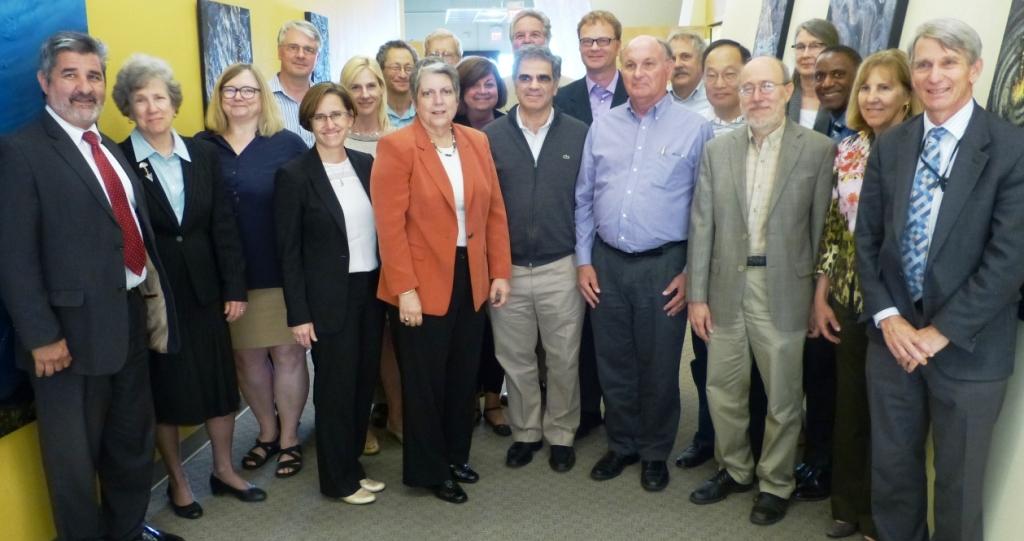 |
2013-14 Academic Council members and alternates pose with UCOP senior administrators. From L: Patrick Lenz, Aimee Dorr, Janice Reiff, Bruno Nachtergaele, Kit Pogliano, Emily Roxworthy, Jose Wudka, Harry Green, President Napolitano, Betty Deakin, Robert Clare, Farid Chehab, Peter Krapp, Dan Hare, Don Senear, Jian-Qiao-Sun, Donald Mastronarde, Tracy Larrabee, Ralph Aldredge, Mary Gilly, and Bill Jacob |
